Thomas James Richards, Diaries, Transcript Vol. 2 - Part 15
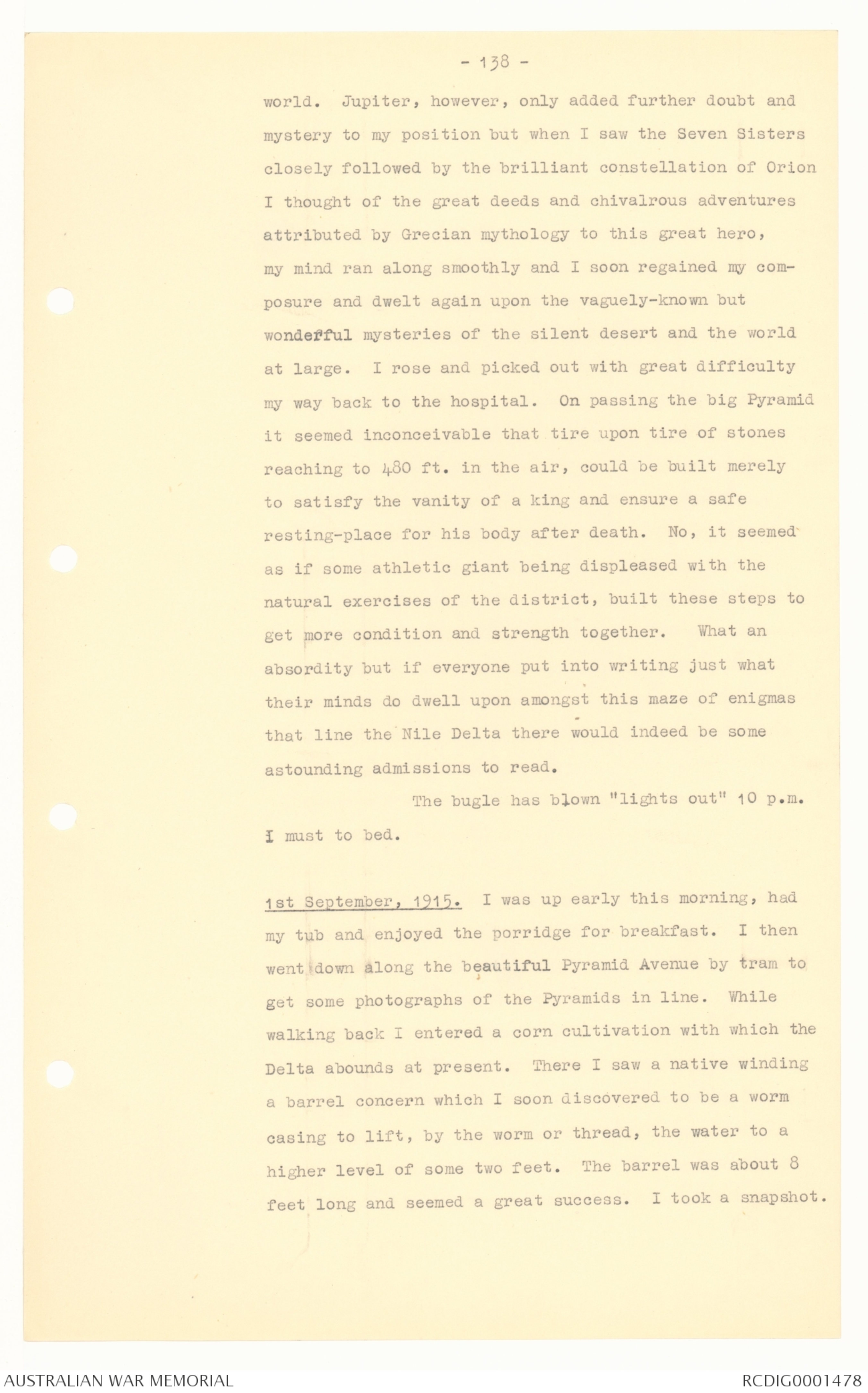
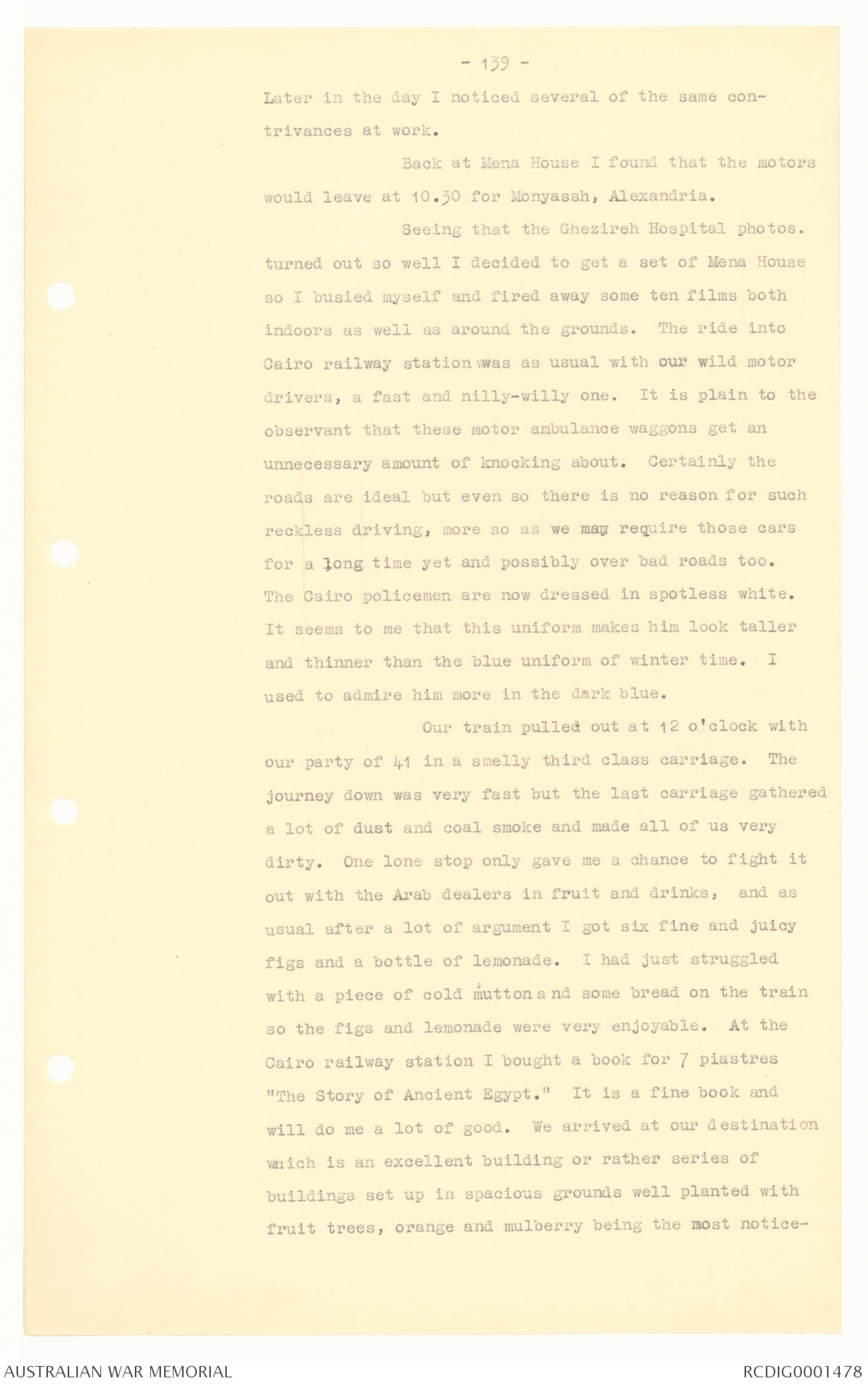
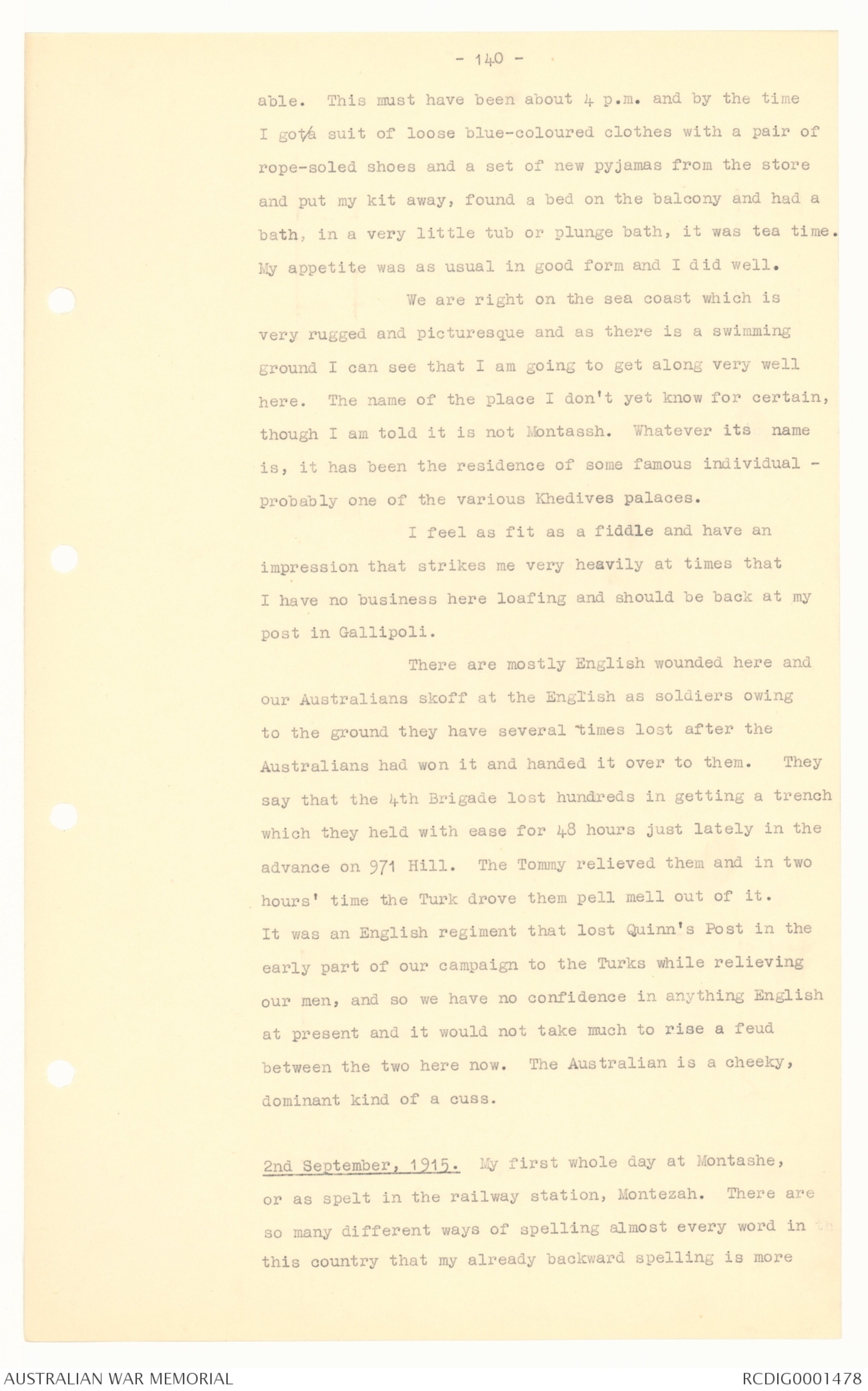
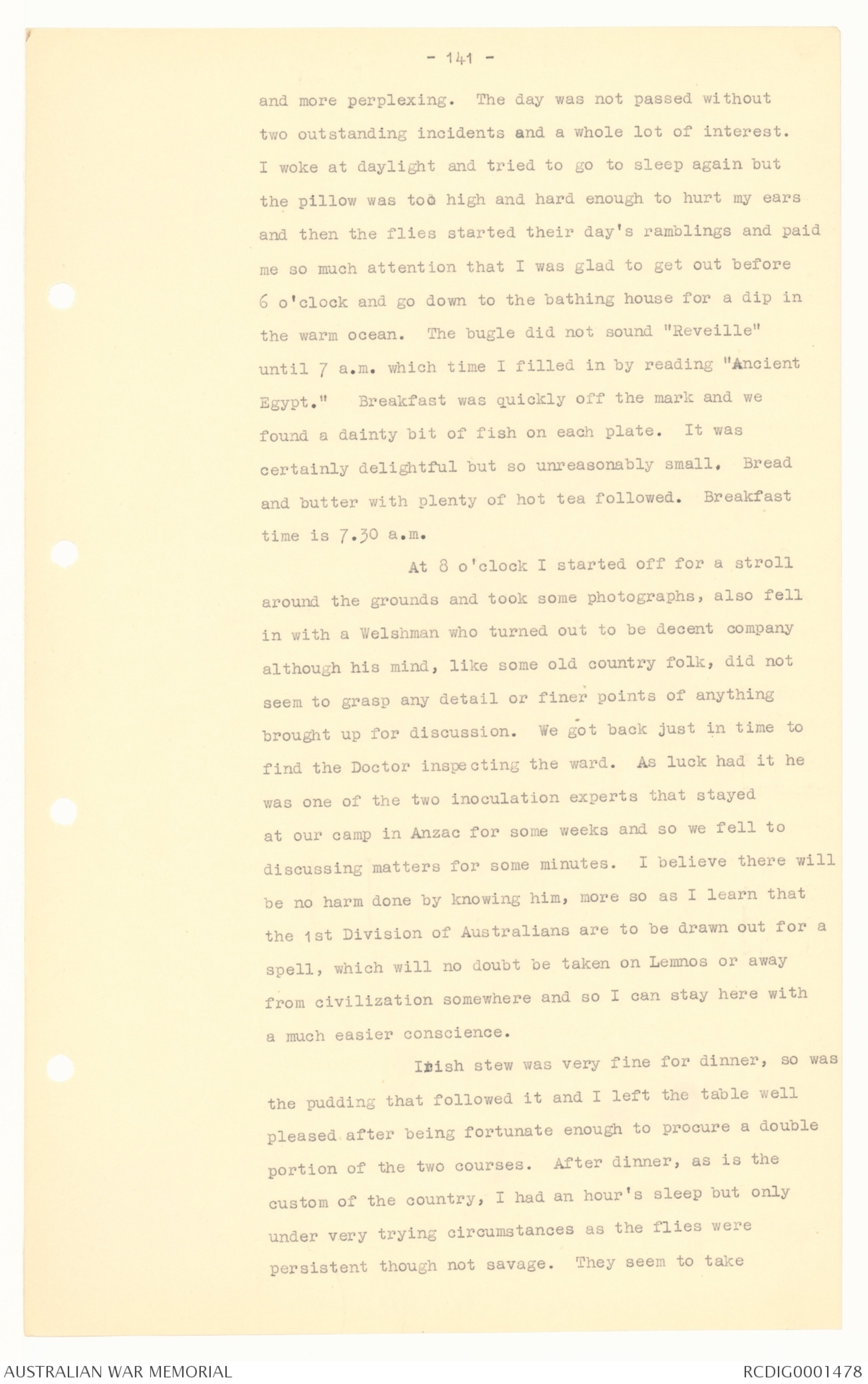
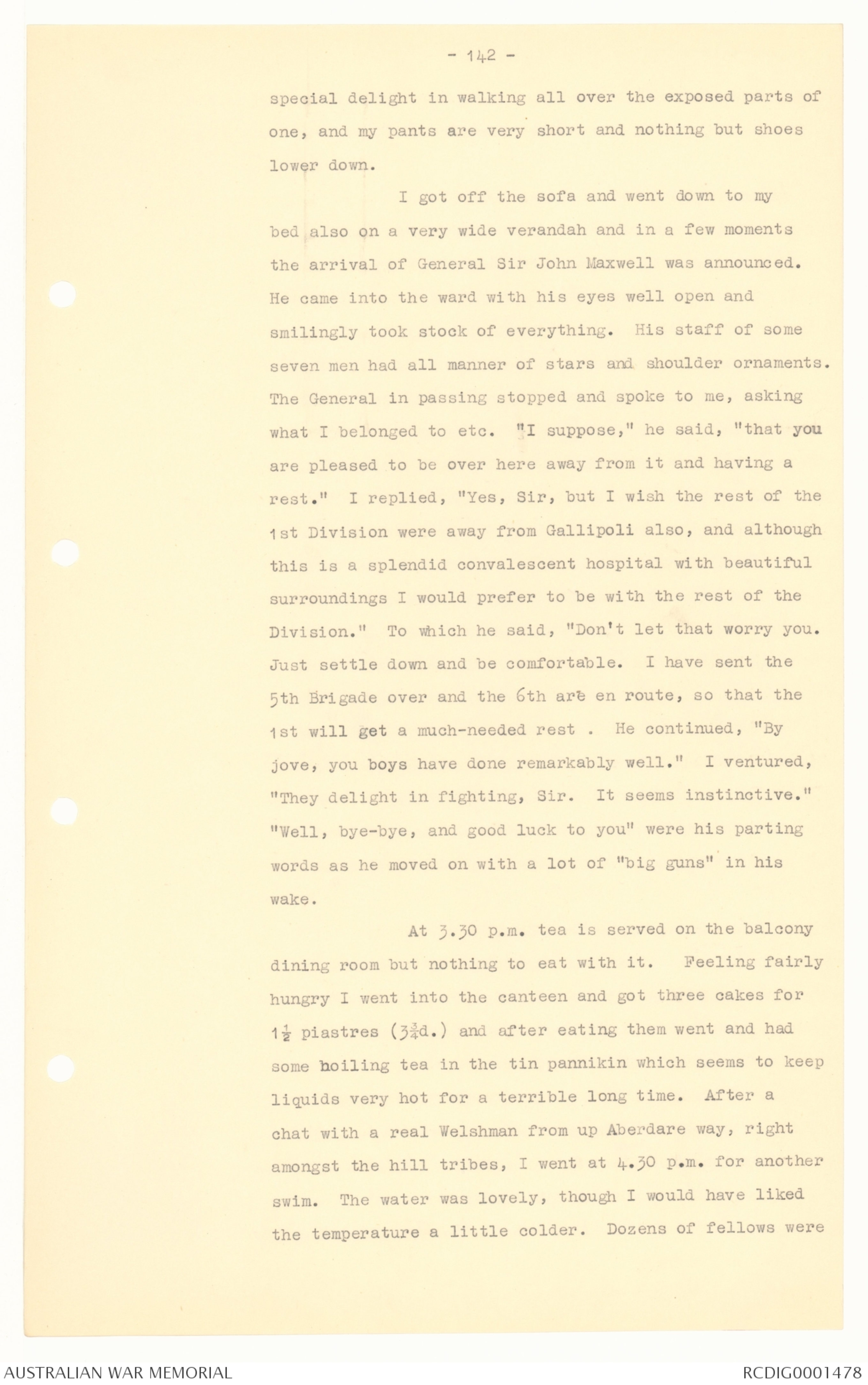
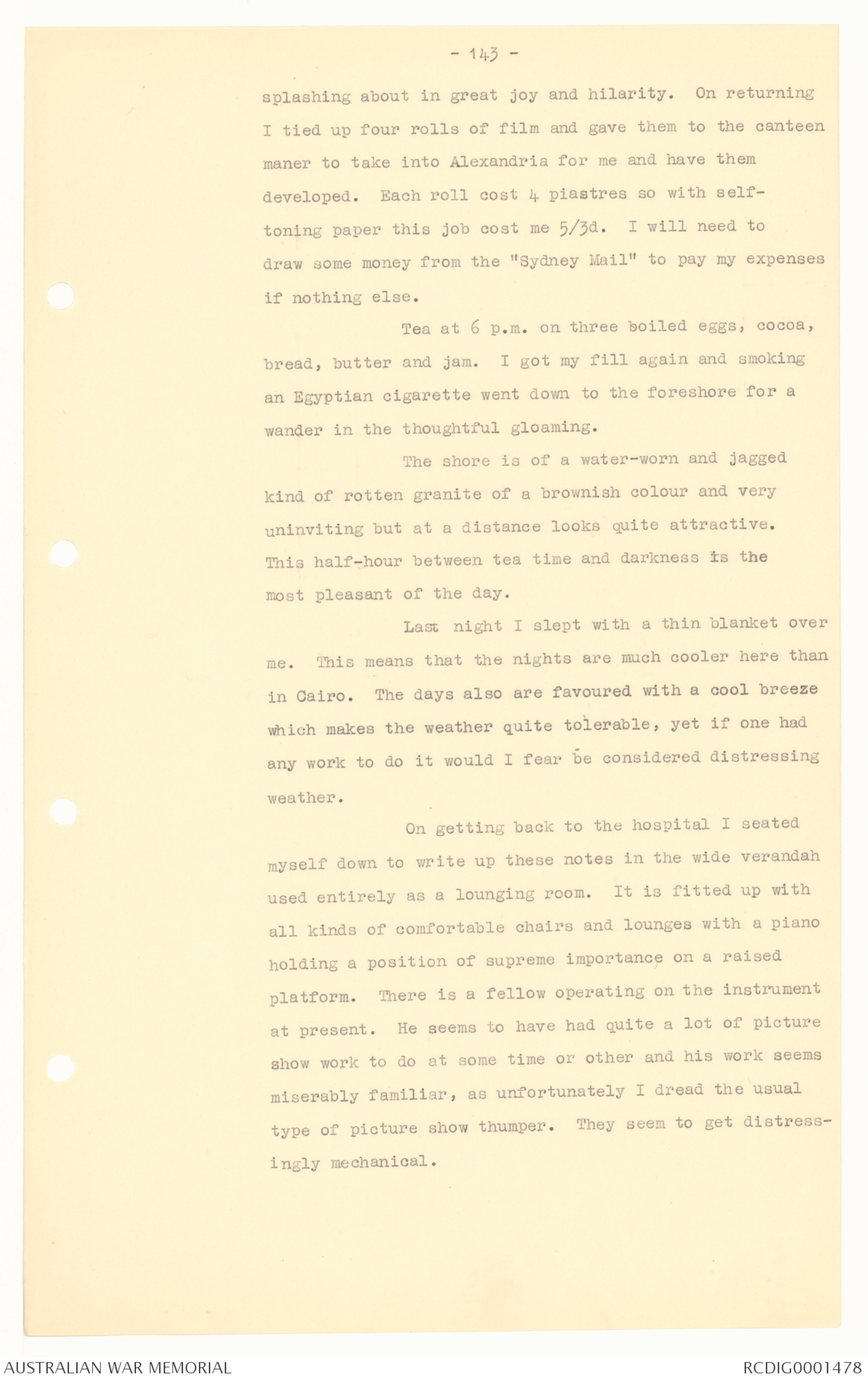
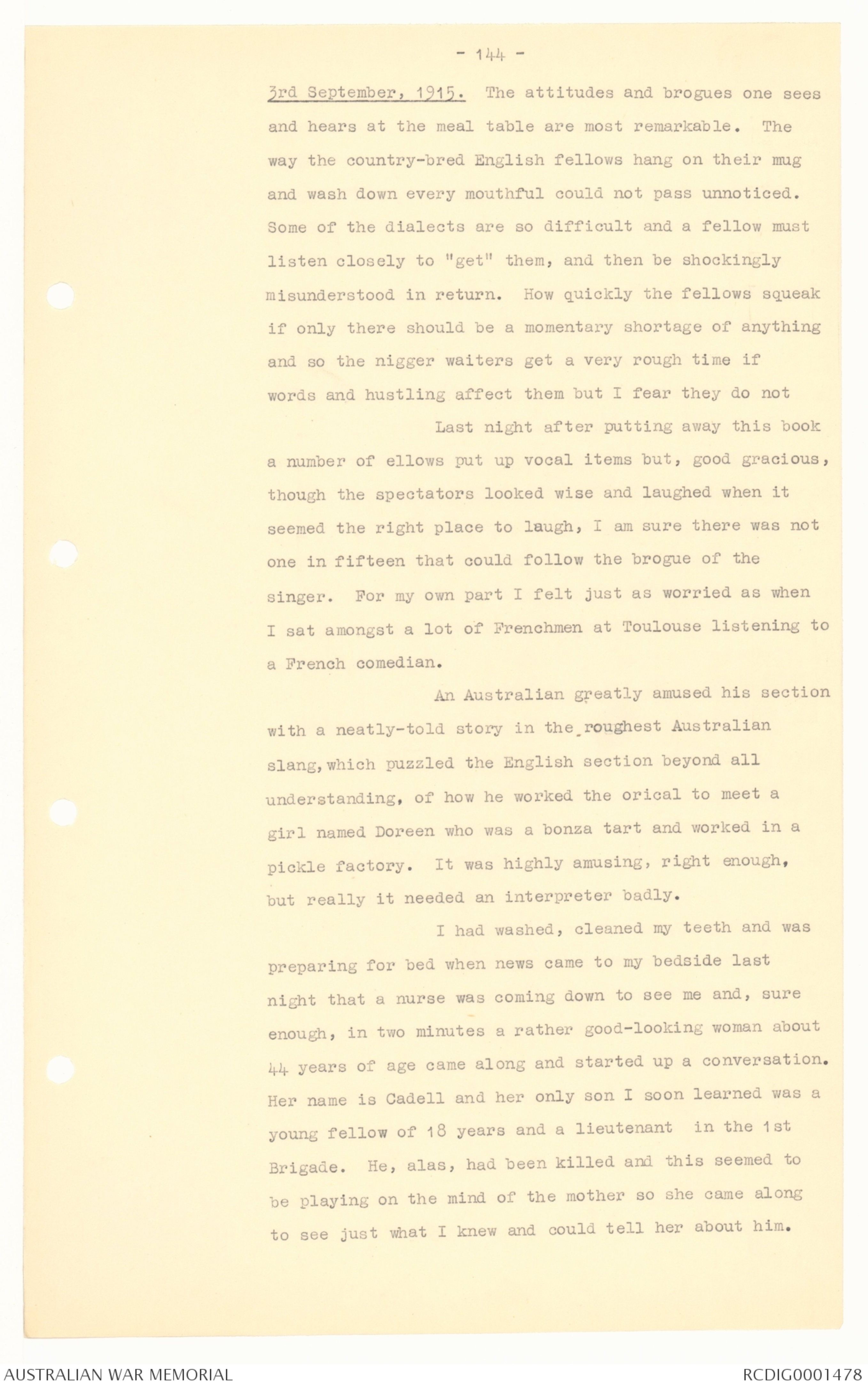
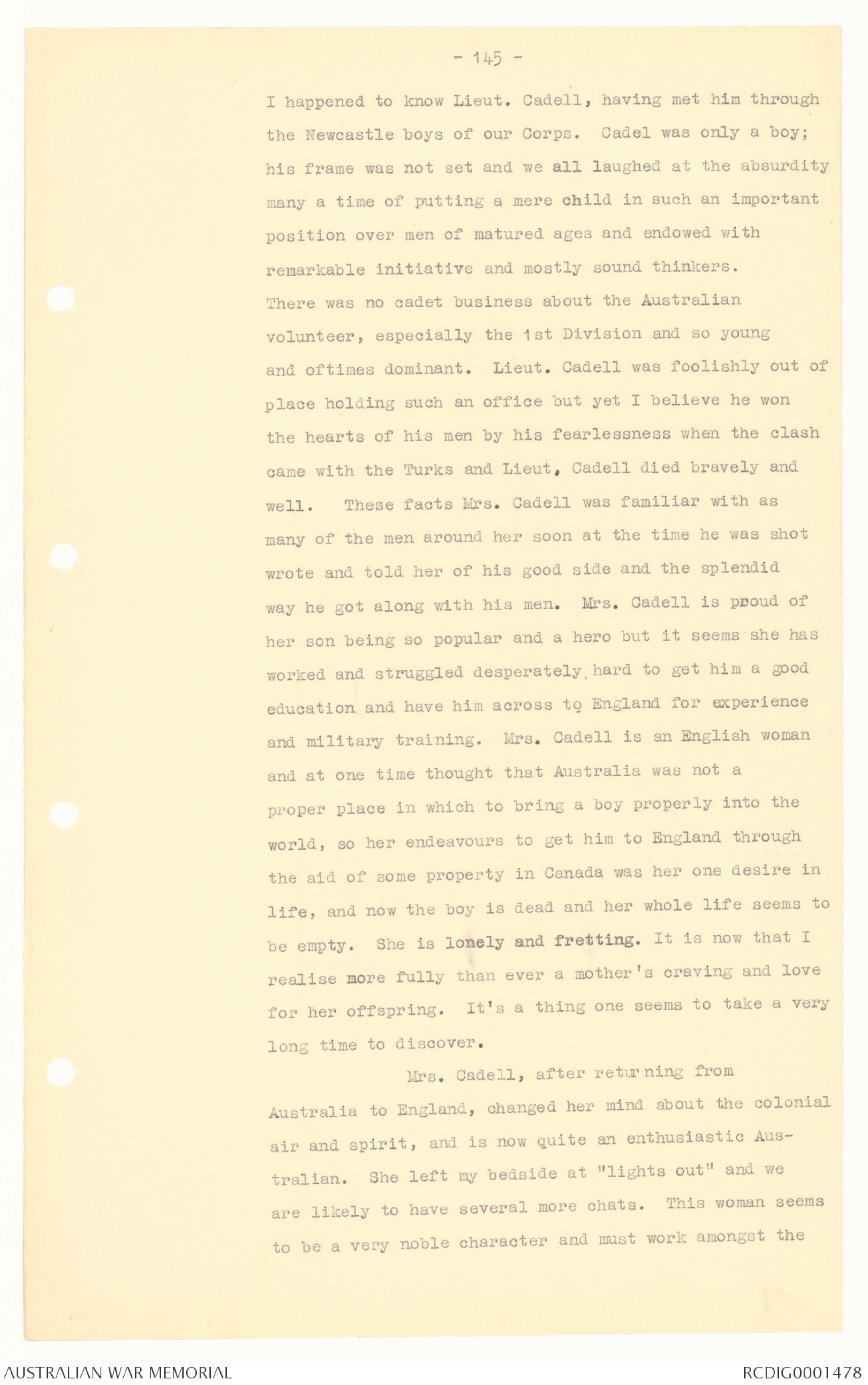
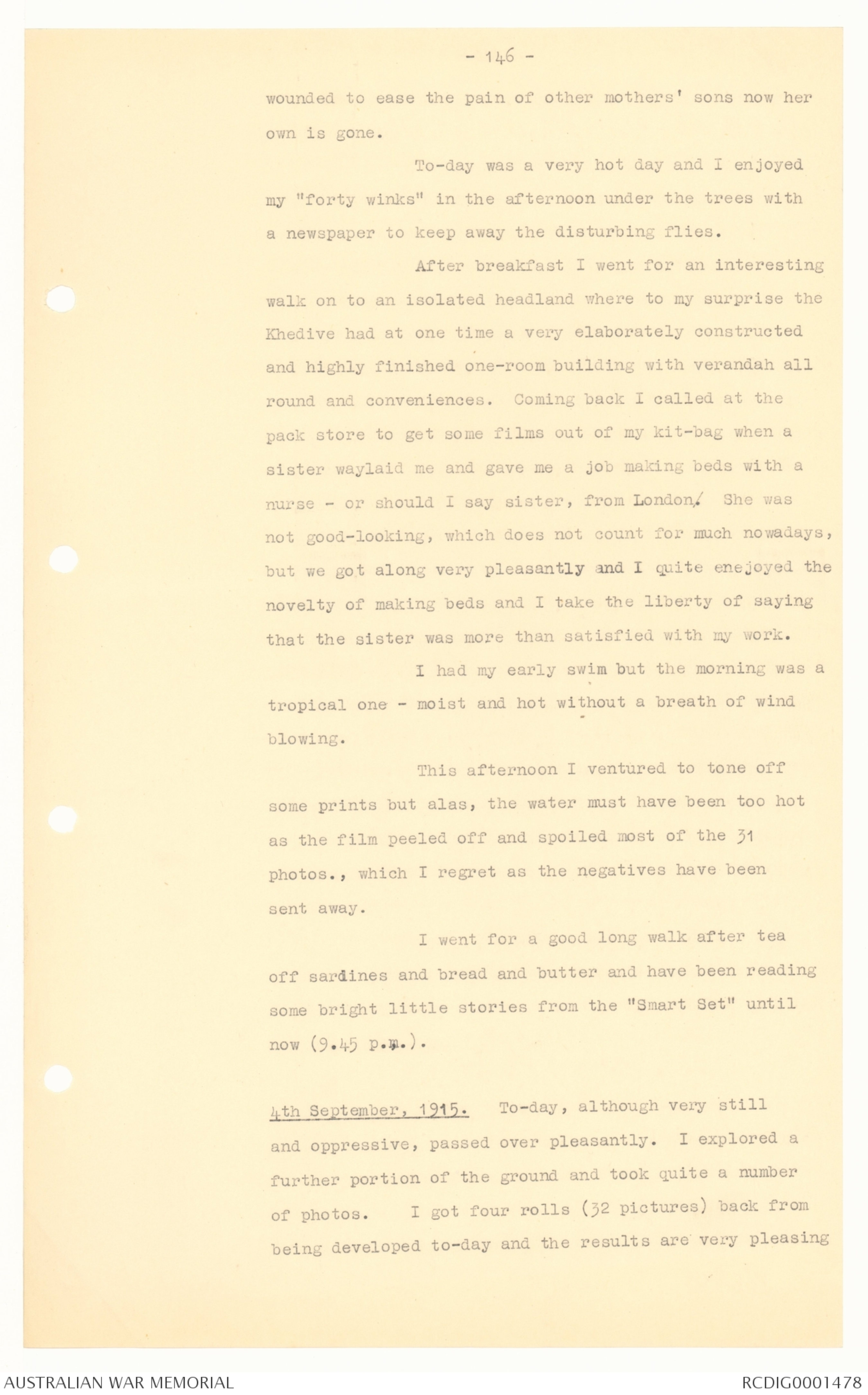
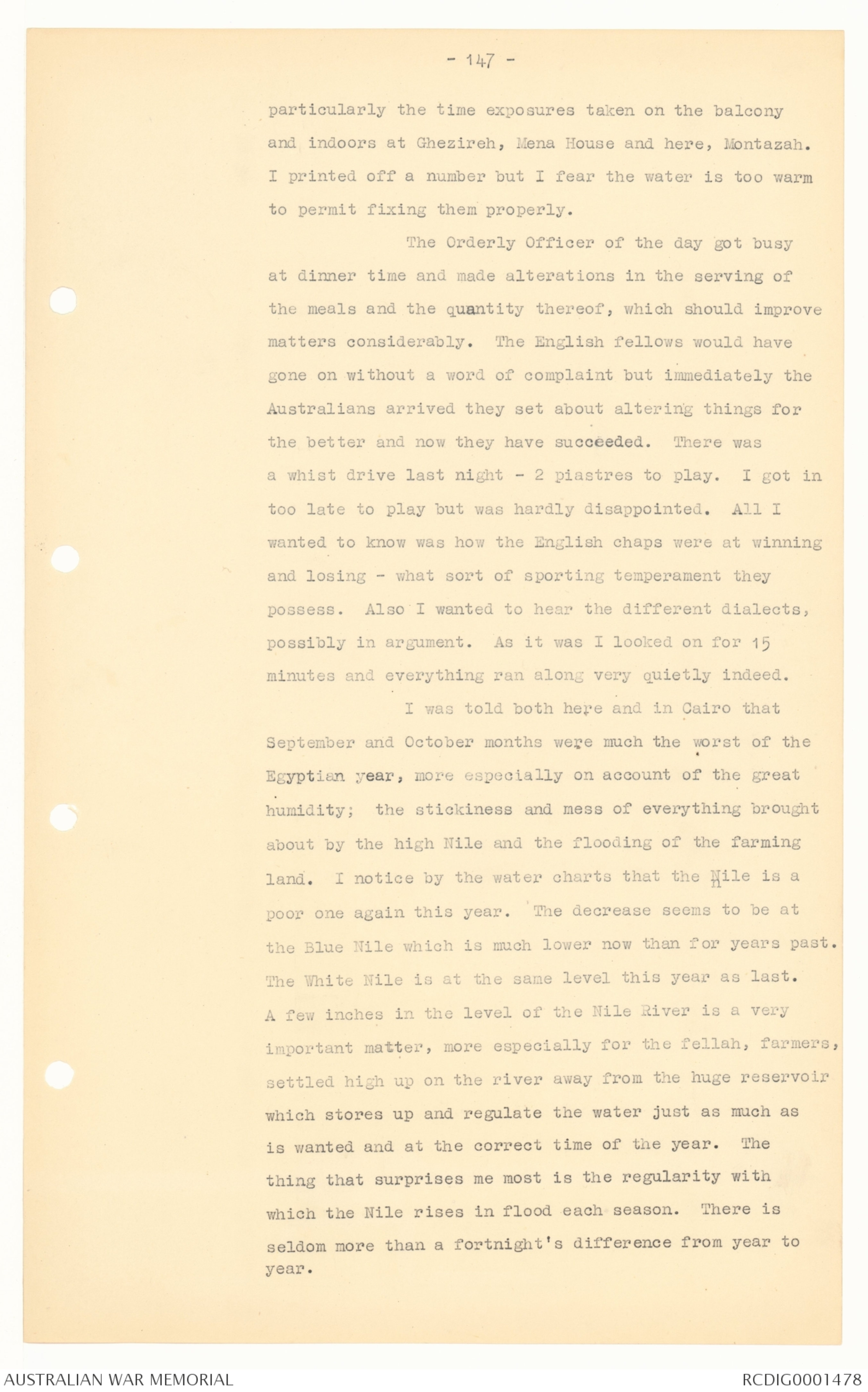
- 138 -
world. Jupiter, however, only added further doubt and
mystery to my position but when I saw the Seven Sisters
closely followed by the brilliant constellation of Orion
I thought of the great deeds and chivalrous adventures
attributed by Grecian mythology to this great hero,
my mind ran along smoothly and I soon regained my
composure and dwelt again upon the vaguely-known but
wonderful mysteries of the silent desert and the world
at large. I rose and picked out with great difficulty
my way back to the hospital. On passing the big Pyramid
it seemed inconceivable that tire upon tire of stones
reaching to 480 ft. in the air, could be built merely
to satisfy the vanity of a king and ensure a safe
resting-place for his body after death. No, it seemed
as if some athletic giant being displeased with the
natural exercises of the district, built these steps to
get more condition and strength together. What an
absordity but if everyone put into writing just what
their minds do dwell upon amongst this maze of enigmas
that line the Nile Delta there would indeed be some
astounding admissions to read.
The bugle has blown "lights out" 10 p.m.
I must to bed.
1st September, 1915. I was up early this morning, had
my tub and enjoyed the porridge for breakfast. I then
went down along the beautiful Pyramid Avenue by tram to
get some photographs of the Pyramids in line. While
walking back I entered a corn cultivation with which the
Delta abounds at present. There I saw a native winding
a barrel concern which I soon discovered to be a worm
casing to lift, by the worm or thread, the water to a
higher level of some two feet. The barrel was about 8
feet long and seemed a great success. I took a snapshot.
- 139 -
Later in the day I noticed several of the same
contrivances at work.
Back at Mena House I found that the motors
would leave at 10.30 for Monyassh, Alexandria.
Seeing that the Ghezireh Hospital photos.
turned out so well I decided to get a set of Mena House
so I busied myself and fired away some ten films both
indoors as well as around the grounds. The ride into
Cairo railway station was as usual with our wild motor
drivers, a fast and nilly-willy one. It is plain to the
observant that these motor ambulance waggons get an
unnecessary amount of knocking about. Certainly the
roads are ideal but even so there is no reason for such
reckless driving, more so as we may require those cars
for a long time yet and possibly over bad roads too.
The Cairo policemen are now dressed in spotless white.
It seems to me that this uniform makes him look taller
and thinner than the blue uniform of winter time. I
used to admire him more in the dark blue.
Our train pulled out at 12 o'clock with
our party of 41 in a smelly third class carriage. The
journey down was very fast but the last carriage gathered
a lot of dust and coal smoke and made all of us very
dirty. One lone stop only gave me a chance to fight it
out with the Arab dealers in fruit and drinks, and as
usual after a lot of argument I got six fine and juicy
figs and a bottle of lemonade. I had just struggled
with a piece of cold mutton and some bread on the train
so the figs and lemonade were very enjoyable. At the
Cairo railway station I bought a book for 7 piastres
"The Story of Ancient Egypt." It is a fine book and
will do me a lot of good. We arrived at our destination
which is an excellent building or rather series of
buildings set up in spacious grounds well planted with
fruit trees, orange and mulberry being the most noticeable.
- 140 -
This must have been about 4 p.m. and by the time
I got/a suit of loose blue-coloured clothes with a pair of
rope-soled shoes and a set of new pyjamas from the store
and put my kit away, found a bed on the balcony and had a
bath, in a very little tub or plunge bath, it was tea time.
My appetite was as usual in good form and I did well.
We are right on the sea coast which is
very rugged and picturesque and as there is a swimming
ground I can see that I am going to get along very well
here. The name of the place I don’t yet know for certain,
though I am told it is not Montassh. Whatever its name
is, it has been the residence of some famous individual -
probably one of the various Khedives palaces.
I feel as fit as a fiddle and have an
impression that strikes me very heavily at times that
I have no business here loafing and should be back at my
post in Gallipoli.
There are mostly English wounded here and
our Australians skoff at the English as soldiers owing
to the ground they have several times lost after the
Australians had won it and handed it over to them. They
say that the 4th Brigade lost hundreds in getting a trench
which they held with ease for 48 hours just lately in the
advance on 971 Hill. The Tommy relieved them and in two
hours' time the Turk drove them pell mell out of it.
It was an English regiment that lost Quinn's Post in the
early part of our campaign to the Turks while relieving
our men, and so we have no confidence in anything English
at present and it would not take much to rise a feud
between the two here now. The Australian is a cheeky,
dominant kind of a cuss.
2nd September, 1915. My first whole day at Montashe,
or as spelt in the railway station, Montezah. There are
so many different ways of spelling almost every word in
this country that my already backward spelling is more
- 141 -
and more perplexing. The day was not passed without
two outstanding incidents and a whole lot of interest.
I woke at daylight and tried to go to sleep again but
the pillow was too high and hard enough to hurt my ears
and then the flies started their day's ramblings and paid
me so much attention that I was glad to get out before
6 o'clock and go down to the bathing house for a dip in
the warm ocean. The bugle did not sound "Reveille"
until 7 a.m. which time I filled in by reading "Ancient
Egypt." Breakfast was quickly off the mark and we
found a dainty bit of fish on each plate. It was
certainly delightful but so unreasonably small. Bread
and butter with plenty of hot tea followed. Breakfast
time is 7.30 a.m.
At 8 o'clock I started off for a stroll
around the grounds and took some photographs, also fell
in with a Welshman who turned out to be decent company
although his mind, like some old country folk, did not
seem to grasp any detail or finer points of anything
brought up for discussion. We got back just in time to
find the Doctor inspecting the ward. As luck had it he
was one of the two inoculation experts that stayed
at our camp in Anzac for some weeks and so we fell to
discussing matters for some minutes. I believe there will
be no harm done by knowing him, more so as I learn that
the 1st Division of Australians are to be drawn out for a
spell, which will no doubt be taken on Lemnos or away
from civilization somewhere and so I can stay here with
a much easier conscience.
Irish stew was very fine for dinner, so was
the pudding that followed it and I left the table well
pleased after being fortunate enough to procure a double
portion of the two courses. After dinner, as is the
custom of the country, I had an hour's sleep but only
under very trying circumstances as the flies were
persistent though not savage. They seem to take
- 142 -
special delight in walking all over the exposed parts of
one, and my pants are very short and nothing but shoes
lower down.
I got off the sofa and went down to my
bed also on a very wide verandah and in a few moments
the arrival of General Sir John Maxwell was announced.
He came into the ward with his eyes well open and
smilingly took stock of everything. His staff of some
seven men had all manner of stars and shoulder ornaments.
The General in passing stopped and spoke to me, asking
what I belonged to etc. "I suppose," he said, "that you
are pleased to be over here away from it and having a
rest." I replied, "Yes, Sir, but I wish the rest of the
1st Division were away from Gallipoli also, and although
this is a splendid convalescent hospital with beautiful
surroundings I would prefer to be with the rest of the
Division." To which he said, "Don’t let that worry you.
Just settle down and be comfortable. I have sent the
5th Brigade over and the 6th are en route, so that the
1st will get a much-needed rest . He continued, "By
jove, you boys have done remarkably well." I ventured,
"They delight in fighting, Sir. It seems instinctive."
"Well, bye-bye, and good luck to you" were his parting
words as he moved on with a lot of "big guns" in his
wake.
At 3.30 p.m. tea is served on the balcony
dining room but nothing to eat with it. Feeling fairly
hungry I went into the canteen and got three cakes for
1½ piastres (3¾d.) and after eating them went and had
some boiling tea in the tin pannikin which seems to keep
liquids very hot for a terrible long time. After a
chat with a real Welshman from up Aberdare way, right
amongst the hill tribes, I went at 4.30 p.m. for another
swim. The water was lovely, though I would have liked
the temperature a little colder. Dozens of fellows were
- 143 -
splashing about in great joy and hilarity. On returning
I tied up four rolls of film and gave them to the canteen
maner to take into Alexandria for me and have them
developed. Each roll cost 4 piastres so with
self-toning paper this job cost me 5/3d. I will need to
draw some money from the "Sydney Mail" to pay my expenses
if nothing else.
Tea at 6 p.m. on three boiled eggs, cocoa,
bread, butter and jam. I got my fill again and smoking
an Egyptian cigarette went down to the foreshore for a
wander in the thoughtful gloaming.
The shore is of a water-worn and jagged
kind of rotten granite of a brownish colour and very
uninviting but at a distance looks quite attractive.
This half-hour between tea time and darkness is the
most pleasant of the day.
Last night I slept with a thin blanket over
me. This means that the nights are much cooler here than
in Cairo. The days also are favoured with a cool breeze
which makes the weather quite tolerable, yet if one had
any work to do it would I fear be considered distressing
weather.
On getting back to the hospital I seated
myself down to write up these notes in the wide verandah
used entirely as a lounging room. It is fitted up with
all kinds of comfortable chairs and lounges with a piano
holding a position of supreme importance on a raised
platform. There is a fellow operating on the instrument
at present. He seems to have had quite a lot of picture
show work to do at some time or other and his work seems
miserably familiar, as unfortunately I dread the usual
type of picture show thumper. They seem to get distressingly
mechanical.
- 144 -
3rd September, 1915. The attitudes and brogues one sees
and hears at the meal table are most remarkable. The
way the country-bred English fellows hang on their mug
and wash down every mouthful could not pass unnoticed.
Some of the dialects are so difficult and a fellow must
listen closely to "get" them, and then be shockingly
misunderstood in return. How quickly the fellows squeak
if only there should be a momentary shortage of anything
and so the nigger waiters get a very rough time if
words and hustling affect them but I fear they do not
Last night after putting away this book
a number of ellows put up vocal items but, good gracious,
though the spectators looked wise and laughed when it
seemed the right place to laugh, I am sure there was not
one in fifteen that could follow the brogue of the
singer. For my own part I felt just as worried as when
I sat amongst a lot of Frenchmen at Toulouse listening to
a French comedian.
An Australian greatly amused his section
with a neatly-told story in the roughest Australian
slang, which puzzled the English section beyond all
understanding, of how he worked the orical to meet a
girl named Doreen who was a bonza tart and worked in a
pickle factory. It was highly amusing, right enough,
but really it needed an interpreter badly.
I had washed, cleaned my teeth and was
preparing for bed when news came to my bedside last
night that a nurse was coming down to see me and, sure
enough, in two minutes a rather good-looking woman about
44 years of age came along and started up a conversation.
Her name is Cadell and her only son I soon learned was a
young fellow of 18 years and a lieutenant in the 1st
Brigade. He, alas, had been killed and this seemed to
be playing on the mind of the mother so she came along
to see just what I knew and could tell her about him.
- 145 -
I happened to know Lieut. Cadell, having met him through
the Newcastle boys of our Corps. Cadel was only a boy;
his frame was not set and we all laughed at the absurdity
many a time of putting a mere child in such an important
position over men of matured ages and endowed with
remarkable initiative and mostly sound thinkers.
There was no cadet business about the Australian
volunteer, especially the 1st Division and so young
and oftimes dominant. Lieut. Cadell was foolishly out of
place holding such an office but yet I believe he won
the hearts of his men by his fearlessness when the clash
came with the Turks and Lieut. Cadell died bravely and
well. These facts Mrs. Cadell was familiar with as
many of the men around her soon at the time he was shot
wrote and told her of his good side and the splendid
way he got along with his men. Mrs. Cadell is proud of
her son being so popular and a hero but it seems she has
worked and struggled desperately hard to get him a good
education and have him across to England for experience
and military training. Mrs. Cadell is an English woman
and at one time thought that Australia was not a
proper place in which to bring a boy properly into the
world, so her endeavours to get him to England through
the aid of some property in Canada was her one desire in
life, and now the boy is dead and her whole life seems to
be empty. She is lonely and fretting. It is now that I
realise more fully than ever a mother's craving and love
for her offspring. It's a thing one seems to take a very
long time to discover.
Mrs. Cadell, after returning from
Australia to England, changed her mind about the colonial
air and spirit, and is now quite an enthusiastic
Australian. She left my bedside at "lights out" and we
are likely to have several more chats. This woman seems
to be a very noble character and must work amongst the
- 146 -
wounded to ease the pain of other mothers' sons now her
own is gone.
To-day was a very hot day and I enjoyed
my "forty winks" in the afternoon under the trees with
a newspaper to keep away the disturbing flies.
After breakfast I went for an interesting
walk on to an isolated headland where to my surprise the
Khedive had at one time a very elaborately constructed
and highly finished one-room building with verandah all
round and conveniences. Coming back I called at the
pack store to get some films out of my kit-bag when a
sister waylaid me and gave me a job making beds with a
nurse - or should I say sister, from London/. She was
not good-looking, which does not count for much nowadays,
but we got along very pleasantly and I quite enejoyed the
novelty of making beds and I take the liberty of saying
that the sister was more than satisfied with my work.
I had my early swim but the morning was a
tropical one - moist and hot without a breath of wind
blowing.
This afternoon I ventured to tone off
some prints but alas, the water must have been too hot
as the film peeled off and spoiled most of the 31
photos., which I regret as the negatives have been
sent away.
I went for a good long walk after tea
off sardines and bread and butter and have been reading
some bright little stories from the "Smart Set" until
now (9.45 p.m.).
4th September, 1915. To-day, although very still
and oppressive, passed over pleasantly. I explored a
further portion of the ground and took quite a number
of photos. I got four rolls (32 pictures) back from
being developed to-day and the results are very pleasing
- 147 -
particularly the time exposures taken on the balcony
and indoors at Ghezireh, Mena House and here, Montazah.
I printed off a number but I fear the water is too warm
to permit fixing them properly.
The Orderly Officer of the day got busy
at dinner time and made alterations in the serving of
the meals and the quantity thereof, which should improve
matters considerably. The English fellows would have
gone on without a word of complaint but immediately the
Australians arrived they set about altering things for
the better and now they have succeeded. There was
a whist drive last night - 2 piastres to play. I got in
too late to play but was hardly disappointed. All I
wanted to know was how the English chaps were at winning
and losing - what sort of sporting temperament they
possess. Also I wanted to hear the different dialects,
possibly in argument. As it was I looked on for 15
minutes and everything ran along very quietly indeed.
I was told both here and in Cairo that
September and October months were much the worst of the
Egyptian year, more especially on account of the great
humidity; the stickiness and mess of everything brought
about by the high Nile and the flooding of the farming
land. I notice by the water charts that the Nile is a
poor one again this year. The decrease seems to be at
the Blue Nile which is much lower now than for years past.
The White Nile is at the same level this year as last.
A few inches in the level of the Nile River is a very
important matter, more especially for the fellah, farmers,
settled high up on the river away from the huge reservoir
which stores up and regulate the water just as much as
is wanted and at the correct time of the year. The
thing that surprises me most is the regularity with
which the Nile rises in flood each season. There is
seldom more than a fortnight's difference from year to
year.
 Loretta Corbett
Loretta CorbettThis transcription item is now locked to you for editing. To release the lock either Save your changes or Cancel.
This lock will be automatically released after 60 minutes of inactivity.